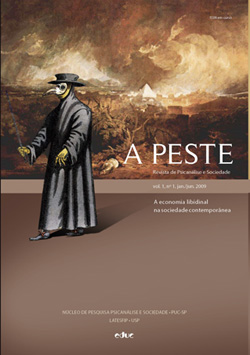A praga do capitalismo e a peste da psicanálise
DOI:
https://doi.org/10.5546/peste.v1i1.2704Resumo
Resumo: A alienação originária e constitutiva do sujeito leva-o a oferecerse como instrumento de um Outro (um Pai Onipotente), na esperança de escapar aos sofrimentos ordinários da vida humana. Na construção do laço social, os sujeitos elaboram um saber coletivo, que os assegure da ilusão mútua de que estão juntos na mesma fantasia e de que se remetem ao único e mesmo Outro Absoluto e sem falhas. Isso constitui a disposição estrutural e “trans-histórica” do laço social, presente em qualquer sociedade humana. O objetivo deste trabalho é ressaltar a existência de um adicional de alienação do laço social implicado pelo capitalismo, que responde por uma ampliação crescente e por um acréscimo progressivo da alienação do sujeito, nessa forma histórica específica de sociedade. Salienta-se a contribuição relevante que Marx, Weber, Marcuse e outros pensadores ofereceram para a compreensão de aspectos essenciais da sociedade capitalista. Mas argumenta-se que a Psicanálise também tenha uma contribuição importante a esse respeito, ao esclarecer de que modo o próprio sujeito também está implicado nesse processo, oferecendo a sua cota de contribuição para a “tendência totalitária à alienação” do laço social capitalista. Propõe-se uma articulação entre a “metáfora paterna”, formulada por Lacan, e a instituição social do “equivalente-geral”, que permite estabelecer “valores-de-troca” das mercadorias. Argumenta-se que isto possibilitou a fixação e padronização do que aqui se denominou “valores-desejos” pelos objetos e gerou um ponto crítico nas transformações históricas, ocasionando a expansão e progressão exponencial da tendência totalitária à alienação do laço social capitalista (o “discurso do capitalista”). Palavras-chave: Psicanálise; capitalismo; alienação; laço social; ideologia; desejo; mercadoria. Abstract: The alienation that originates in and constitutes the subject makes him offer himself as an instrument of Another (an Omnipotent Father), in the hope that he can escape from the ordinary sufferings of human life. In the construction of the social bond, the subjects develop a collective knowledge that assures them of the mutual illusion that they are together in the same fantasy and that they refer to the single and same Absolute Other that has no flaws. This constitutes the structural and “trans-historical” disposition of the social bond, present in any human society. The aim of this work is to highlight the existence of an additional alienation of the social bond implied by capitalism, which is responsible for an gradual extension of and a progressive increase in the subject’s alienation, in this specific historical form of society. The paper highlights the relevant contribution that Marx, Weber, Marcuse and other thinkers offered to the understanding of essential aspects of the capitalist society. But it is argued that Psychoanalysis also has an important contribution in this respect, as it clarifies in what way the subject is also involved in this process, offering his share of contribution to the “totalitarian tendency to alienation” of the capitalist social bond. An articulation is proposed between the “paternal metaphor” formulated by Lacan, and the social institution of the “general equivalent”, which allows to establish “exchange values” of commodities. It is argued that this enabled the fixation and standardization of what was called here “values-desires” for the objects and generated a critical point in the historical transformations, causing the expansion and exponential progression of the totalitarian tendency to alienation of the capitalist social bond (the “capitalist’s discourse”). Keywords: Psychoanalysis; capitalism; alienation; social bond; ideology; desire; commodity.Métricas
Carregando Métricas ...
Downloads
Como Citar
Pacheco Filho, R. A. (2010). A praga do capitalismo e a peste da psicanálise. A PESTE: Revista De Psicanálise E Sociedade E Filosofia., 1(1). https://doi.org/10.5546/peste.v1i1.2704
Edição
Seção
Artigos

